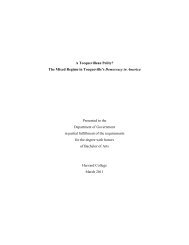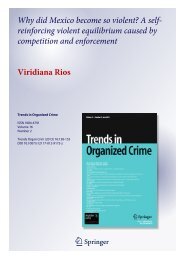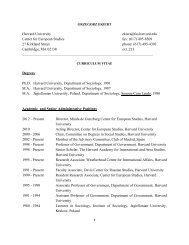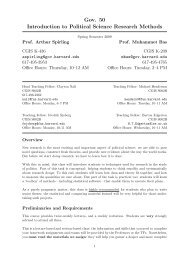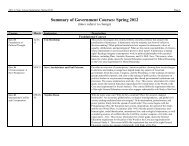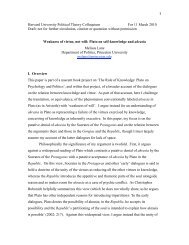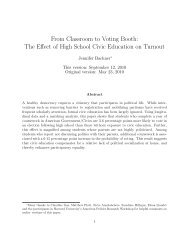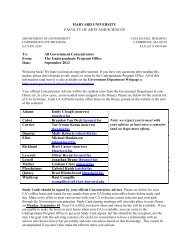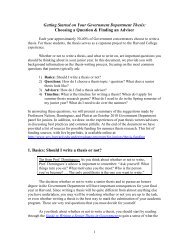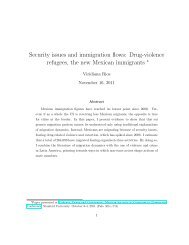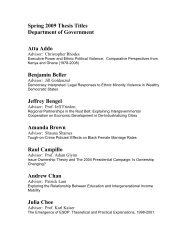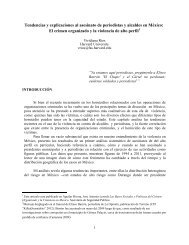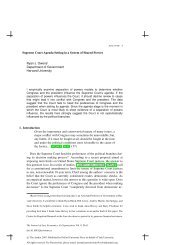Why are Mexican mayors getting killed by traffickers? The dynamics ...
Why are Mexican mayors getting killed by traffickers? The dynamics ...
Why are Mexican mayors getting killed by traffickers? The dynamics ...
Create successful ePaper yourself
Turn your PDF publications into a flip-book with our unique Google optimized e-Paper software.
states which can central-enforce and provide public services.<br />
In short, because legal trade increases illegal profits, even very powerful DTOs may find it<br />
harmful to dismantel the state and/or to substitute it <strong>by</strong> a parallel criminal state. Actually,<br />
the best scenario for DTOs is one in which they do not have to take the cumbersome and<br />
overly public task of ruling a country themselves. Traffickers prefer to outsource politics to a<br />
sufficiently strong and centralized government that will ensure the survival of illegal businesses.<br />
<strong>The</strong> paradox of the political/criminal nexus is a simple but powerful one: having a state reduces<br />
operational costs for drug <strong>traffickers</strong> (e.g. provides infrastructure, and increase legal trade) but<br />
also weakens <strong>traffickers</strong> because dealing with the state may entail non-trivial monetary costs<br />
(i.e. bribes).<br />
Lemma 1: Organized crime (i.e. a group of drug <strong>traffickers</strong> (N)) prefers to have a legitimate<br />
state (i.e. a group of politicians (A)) than to become the state, independently its relative<br />
strength (P n ) versus that of the state (P a ).<br />
Given Lemma 1, a question remains as to which would be the mechanism used <strong>by</strong> criminals<br />
and politicians to interact. In the following section, I introduce the traditional way in which the<br />
relationship between politicians and <strong>traffickers</strong> has been understood <strong>by</strong> the literature (“Silveror-lead”<br />
argument).<br />
2 Corruption mechanics: a bargain game between criminals<br />
and politics<br />
<strong>The</strong> political/criminal nexus between organized crime and politicians has so far being understood<br />
as a very straightforward exercise described <strong>by</strong> the “silver-or-lead” dichotomy. Those<br />
politicians ruling in <strong>are</strong>as of interests for <strong>traffickers</strong> have to decide between accepting bribes<br />
(silver) and <strong>getting</strong> <strong>killed</strong> (lead). According to this narrative, bribes <strong>are</strong> determined <strong>by</strong> how<br />
costly corruption is for politicians, as well as <strong>by</strong> the relative power of <strong>traffickers</strong> versus the state<br />
(Bo etal 2006). <strong>The</strong> price of a bribe thus is the outcome of a rational calculation.<br />
<strong>The</strong> price of bribes is determined <strong>by</strong> the relative power of the state versus <strong>traffickers</strong>. As<br />
a government becomes more powerful (i.e. able to enforce law), its ability to extract <strong>traffickers</strong>’<br />
profits via bribes increases. On one side of the spectrum, a powerful government extorts<br />
<strong>traffickers</strong> keeping most of the illegal profits for itself. Such would be the case of Montesinos at<br />
Peru, and the Communist Party at China. On the other side, <strong>traffickers</strong> retain almost all profits<br />
for themselves with small –or non-existent– bribes for authorities. Such would be the world of<br />
trafficker organizations that have managed to work in a virtual autonomy from the state, such<br />
6



